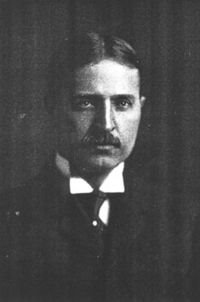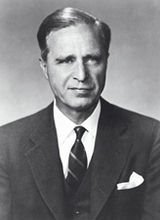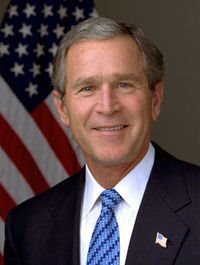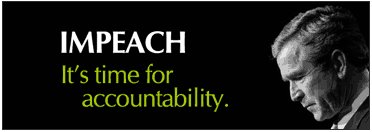
Bush was the son of Harriet Fay and the Rev. James Smith Bush, an Episcopalian priest at Grace Church in Orange. He grew up there and in San Francisco but the family returned to Staten Island. He married Flora Sheldon on June 20, 1894. They had four children: Prescott Sheldon Bush, Robert (who died in childhood), Mary (Mrs. Frank) House, Margaret (Mrs. Stewart) Clement, and James.
Bush graduated from the Stevens Institute of Technology at Hoboken in 1884, where he played in one of the earliest regular college football teams. He took an apprenticeship with the Pittsburgh, Cincinnati, Chicago and St. Louis Railroad at the Logansport, Indiana shops, later transferring to Dennison, Ohio and Columbus, Ohio, where in 1891 he became Master Mechanic, then in 1894 Superintendent of Motive Power. In 1899 he moved to Milwaukee, Wisconsin to take the position of Superintendent of Motive Power with the Chicago, Milwaukee & St. Paul Railroad.
During the height of American isolationism, a Senate Munitions Inquiry, often called the Nye Committee after its chairman, Senator Gerald Nye, critically examined the military-industrial complex of government agencies, corporations, labor unions, and banking. The Nye Committee has been portrayed as a naive isolationist search for evil arms dealers ("Merchants of Death") who caused wars, underplaying the social, intellectual, political, and cultural currents of the 1930s which have more recently been re-examined (see reference Coulter). The Committee was formed in August 1933. It examined World War I military-industrial finances in January and February 1936. In spite of this second historical connection, most of the records and correspondence of Samuel P. Bush's arms-related work with the government were destroyed at the National Archives, in order 'to save space'.
Bush is interred at Green Lawn Cemetery, Columbus, Ohio

Union Banking Corporation (UBC) (for Thyssen and Brown Brothers Harriman)
Holland-American Trading Corporation (with Harriman)
the Seamless Steel Equipment Corporation (with Harriman)
Silesian-American Corporation (with Walker)
There are unsubstantiated rumors concerning Prescott Bush's associations with the Nazi party. The Anti-Defamation League has stated, "Rumors about the alleged Nazi 'ties' of the late Prescott Bush, the grandfather of President George W. Bush, have circulated widely through the Internet in recent years. These charges are untenable and politically motivated." [1] The rumors began with extreme right-wing attacks on George H.W. Bush during his 1980 presidential run and were renewed during his 1988 run.
From a policy standpoint, Bush pursued moderate policies in both domestic and foreign policy. During the final days of the Cold War, he was responsible for managing US foreign policy during the delicate transition of the Soviet Union and eastern Europe from being communist states to being liberal democracies. He championed the concept of a New World Order where international law and global consensus would replace military and strategic confrontation as a means of accomplishing diplomatic objectives. This idea was exemplified during the Gulf War, when the US rallied a global coalition to reverse the invasion of Kuwait by Iraq under Saddam Hussein. In domestic policy, Bush's most notable initiative was the Omnibus Budget Reconciliation Act of 1990, a controversial compromise with congressional Democrats that traded spending controls for tax increases, to balance the federal budget.
 President George Walker Bush
President George Walker Bush George W Bush (born July 6, 1946) is the 43rd and current President of the United States and former governor of Texas. He is the son of the 41st president, George H.W. Bush, brother of the current governor of Florida, Jeb Bush, and grandson of former U.S. Senator Prescott Bush. His family has been in the country since the colonial period and he is a descendant of the Fairbanks family. He is the second son of a former United States president to become president himself; the first was John Quincy Adams.
A member of the Republican Party, Bush was elected the 46th governor of Texas in 1994, then re-elected in 1998. He won the nomination of the Republican Party for the 2000 presidential race and ultimately defeated Democratic Vice President Al Gore in a particularly close and controversial general election ending in the Supreme Court decision Bush v. Gore[1] In 2004, Bush was elected to a second presidential term, defeating John Kerry, the junior Democratic Senator from Massachusetts. His term will expire on January 20, 2009.
Bush's presidency has been defined by the ongoing War on Terror following the September 11, 2001 attacks. After the attacks, Bush and the United States Congress created the Department of Homeland Security and increased the powers of law enforcement agencies with the passage of the USA PATRIOT Act. In 2003, the United States and a multinational force took military action in Iraq, overthrowing and eventually capturing Iraqi President Saddam Hussein. The commitment of United States and British troops has been controversial both domestically and internationally. A central theme in Bush's continuing policy in Iraq has been the creation of a democracy, to which end, Iraq held free elections in 2005.
Bush has also signed into law large tax cuts and a Medicare prescription drug plan. He has appointed two justices to the Supreme Court, Samuel A. Alito and John Roberts, with Roberts fulfilling the post of Chief Justice after the death of William Rehnquist. Bush's terms of office coincided with Republican control of the U.S. Congress, giving him greater control over policy formulation than presidents dealing with an opposition-controlled legislature.
While continuing American policy of support for Israel, Bush also endorsed the creation of a Palestinian state. His promise of $15 billion (over 5 years) to Africa for AIDS relief was funded by Congress. In late 2005 and 2006, Bush led the world community in opposition to Iran's announced intention to develop nuclear technology.
Prior to his political career, he was involved in the oil industry, running several companies related to petroleum energy. He later served as the managing general partner/owner of the Texas Rangers Major League Baseball team.
Bush Authorized Secrets' Release, Libby Testified


